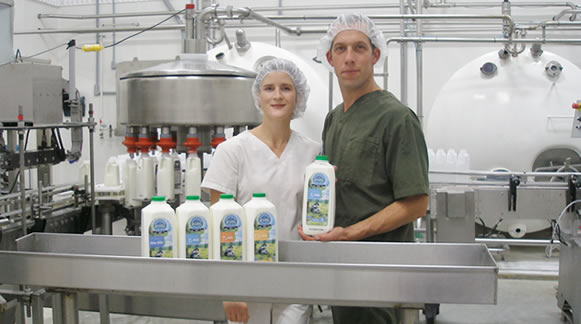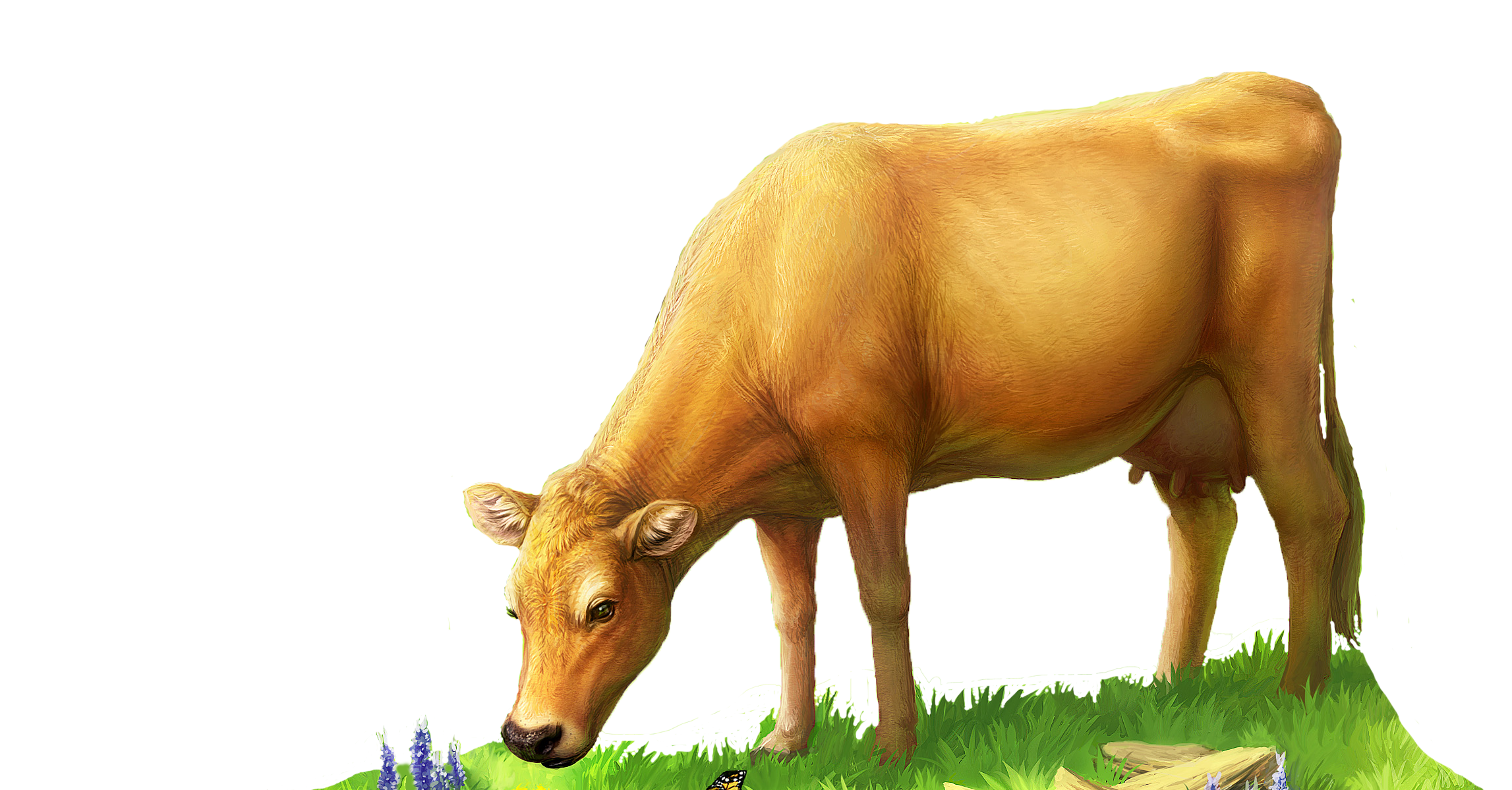Here are some answers to our most frequently asked questions:
Q: Do you sell Raw milk?
No we cannot sell raw milk. It is illegal in Canada to sell or give away raw milk.
Q: What type of method do you use to pasteurize you milk?
There are several method of pasteurization, Batch Pasteurization which is holding a volume of milk at 154.4 F for 30 min, HTST pasteurization which holds the milk at 162 F for 16 seconds and UHT which holds the milk at 280-302F for 1-2 seconds. We use the HTST method as the batch method imparts a cooked pudding flavour to the milk and in our own opinion UHT almost sterilizes the milk leaving it of poor quality for fluid and cheese production and also imparts cooked flavours. HTST pasteurization makes the milk good for both fluid and cheese production and impacts its natural qualities less.
Q: Is your milk Homogenized?
We offer both Non Homogenized Organic Jersey milk where the cream rises to the top and Homogenised Jersey milk. Goat milk is naturally homogenized but we give it a very light homogenization to prevent the top of the bottle from sealing off with a thin layer of cream that will make some consumers assume the milk has gone bad. Homogenization is when milk is run through a very small opening as a high rate of speed. The milk then hits a wall and this forces the balloon like fat molecules to break. The fat does not float to the top of the milk after as a result. Because we only lightly homogenize it does not impact flavour. Homogenization allows the milk to feel creamier on your tongue, look whiter as it reflects more light back at you due to the higher surface area of the fat and most importantly last longer because the bacteria like the fat portion of the milk and if they all congregate at the top like in non-homogenized milk it may spoil the top portion earlier.
Q: What does it mean to be Certified Organic?
Our cow’s milk is certified organic and as such ensures that certain rules and supporting documentation is followed closely. Some of the many factors about Organic practices, feeding and animal welfare are:
- No GMO’s are allowed in the feed for certified organic animals. All feed must be certified organic with supporting documentation and the animals need to be feed certified organic feed for one year prior to being considered certified organic. Certified organic feed means that in addition to being GMO free it is also free of herbicides, fungicides, insecticides and chemical fertilizers.
- The animals are allowed to go outside weather permitting every day if they want too.
- The animals are allowed fresh grass when it is available and in the months it is not available, it be stored for them as hay or silage and that their grain ration be no more than 40% of their diet. This is important as the grass diet imparts a greater amount of beneficial properties to the milk and makes the fats healthier (More Omega 3 and Oligosaccharides). You can see that our milk as it is much yellower than the conventional variety. Also a lower grain ration ensures the longevity of the animal by not pushing them too hard to reach peak production levels.
- Organic Certification allows for more barn space for every animal in comparison to conventional dairies.
- In the processing facility organic products do not come into contact with other non-organic products and preventative measures and records are kept to ensure they do not come into contact with chemicals.
Q: Where does your milk come from?
Our farm’s milk and cheese processing plant processes goat milk and cheese as well as Organic cow milk and creams. The goat milk comes from our own farm right next to the plant. We have been milking goats for 17 years and have a herd of 700 does that we milk twice daily. We love our goats and they are smart inquisitive animals much like dogs. Our organic cow milk comes from a neighbouring farm owned by the Van Os Family. Arnold, his wife and their 9 children take great care and pride in their Jersey cow herd that supplies us with terrifically rich and high quality milk.
Q: Are your animals Happy?
Yes I believe they are. For our family our entire livelihood is dependent on the health and happiness of our milking herd. They eat before we eat, they sleep before we sleep. We genuinely care about our animals. We take great effort to ensure their barns are clean and tidy, they have time outside and that they are entertained. In the case of our goats they are very active and we have taken time to create play areas for them to keep them busy.
Q: Why can people who can’t drink Cow milk drink goat milk?
People often mistake lactose intolerance in cow dairy products with sensitivity to the larger fat and protein molecules in cow milk. The large molecules often cause digestive issues especially in infants and the elderly. Drinking goat milk is a great alternative to cow milk for those people who are sensitive to cow milk because it is the closest thing to human milk we can get. The smaller fat and protein molecule are easily digested and although it is not lactose free it has less lactose than cow milk so even those with lactose issues can often drink it.
Q: Why do you add Vitamins to your Organic cow milk but not to your goat milk?
We need to add vitamins A and D to our Organic Cow milk because in is required by law. We ensure that our vitamins are Organic approved. The vitamins were made mandatory for cow milk but not goat milk and so we do not add them to our goat milk. We prefer our goat milk to be as natural as possible and do not add or take anything away from it.
Q:Are artificial hormones present in milk?
No. There are no artificial growth hormones in Canadian milk. Dairy farmers do not use them because they have not been approved for use by the Canadian government and many do not agree with them.
Q: Is your Organic Jersey milk “Grass Fed Milk”?
In Canada we only really get fresh grass for 4-5 month of the year. In most people’s minds then our Organic Jersey milk would technically be able to be called grass fed for those 4-5 months when the cows have access to fresh grass. The remaining months of the year the cows do have a higher forage based diet then conventional cows but might not have those true fresh grass characteristics that show up in the summer months most evident by the golden yellow colour of the milk itself.
Q: Is your Organic Jersey milk 100% A2 Beta casein in its protein make up?
Jersey cows are one of the types of cows that predominately produce A2 Beta Casein instead of the A1 type. That said there still may be a percentage Jerseys in the herd that put out some A1 since they may have a A1/A2 make up in their genotype instead of an A2/A2 which would guarantee 100% A2 protein.
All the Jersey cows that we get our milk from are currently undergoing genetic testing and the A1/A2 types will be weeded out over the next year or two so as we strive to become 100% A2 certified. So we are not there yet but plan to be.
We have heard many positive consumer reports of people being able to consume our milk when they cannot consume other types of cow milk so hopefully it can work for you. If it does not we also produce goat milk which is definitely 100% A2 in its protein make up.
Q: Is your Goat Milk 100% A2 Beta casein in its protein make up?
Yes. Goats produce A2 Beta caseins in their milk making it easier to digest for people that are sensitive to dairy.


